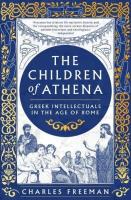
Bloomsbury (2023) 400pp £30 (ISBN 9781803281957)
How did the Greeks get on under the Romans? What was the impact of the Roman empire on Greek intellectuals and Greek intellectual thought?
Two thousand or so years later our classicist Prime Minister Harold Macmillan famously identified the British as playing the part of the Greeks to America’s Romans, the new world power: ‘you will find the Americans much as the Greeks found the Romans—great big, vulgar, bustling people, more vigorous than we are… with more unspoiled virtues…we must run our joint HQ as the Greek slaves ran the operations of the Emperor Claudius’.
All the evidence that Charles Freeman accumulates in this highly readable study shows that clever Greeks did indeed thrive under Roman rule. It was of course a conquest—most Greek cities, Corinth and Athens included, were sacked at various points under the Republic before Achaea formally became a Roman province in 27 BC. But, as Horace had already noted, Graecia capta ferum uictorem cepit (‘captive Greece took captive her savage conqueror’). In the late Republic and in the Empire’s early years the Greeks went to work in Rome—as slaves, administrators, doctors, secretaries; many moved on upwards into imperial public service.
Greeks faced some difficulties: for example, few of them spoke Latin, even under the later empire. But there were probably more Greek speakers than Latin speakers across the empire as a whole. And that empire gave them huge advantages. Peace and stability, new roads, freedom to travel in safety, and academic tolerance that enabled thinkers, teachers, rhetoricians and medics, easily to move around the major centres of learning such as Antioch, Athens, Smyrna and Alexandria. These and other larger cities—Pergamum, Ephesus, Herculaneum—had great libraries. Intellectuals such as Paul, Galen, Strabo, Pausanias, Polybius, Dioscorides and Clement thus travelled widely. The cities themselves flourished too, benefitting from large-scale programmes of public works: theatres, libraries, aqueducts, granaries, paving and sewerage.
F. makes his case partly by looking at the sources that the Greek writers used. Plutarch writing his Essays on a farm in Boeotia quotes from 35 separate sources; the geographer Strabo drew on 20 authors; later, Clement used over 350. They must have had relatively easy access to copies. Alongside the books and libraries continued the religious cults, drama festivals and statuary that exemplified Roman tolerance.
Perhaps another illustration of this benign environment was their social mobility. F. sketches for us detailed portraits of twenty leading intellectuals, from Polybius to Hypatia: more often than not, though mostly born in Asia Minor far from the capital, their fathers were or had just become Roman citizens; some inherited estates and wealth; others moved easily from city to city, establishing self-financing schools of rhetoric and philosophy.
A few played an important role in Greek acquiescence in Roman hegemony. Polybius set it in historical context; Posidonius drew out the link between Roman thinking and the Stoics; Strabo underlined Greek respect for earlier authorities and the spread of culture. Plutarch, born near Delphi, was at home in both cultures, and demonstrated in his Parallel Lives how Rome did best when embracing its Greek past.
That went all the way up the tree. Polybius was a friend of Scipio; the philosopher Epictetus influenced Hadrian; Hadrian in turn had the historian Arrian under his command. Galen became Marcus Aurelius’ doctor. Dio Chrysostom instructed Trajan on kingship. Others won high office: Arrian was a senator and governor of Andalusia; Herodes Atticus became consul; Themistius a senator under Constantine II.
And it worked both ways. The emperors, from Augustus onwards, were keen to model themselves as heroic monarchs in the Hellenistic tradition. Like Alexander, they saw themselves as defenders of the wider Mediterranean civilisation. Hadrian, a longtime admirer of all things Greek, labelled himself restitutor, reforming both Athens’s public buildings and its civic governance.
F. concludes that under the early Roman empire the Greek intellectual world was not just stable: it was vibrant and fertile. The Romans deserve enormous credit for that. They respected most features of Greek civilisation. They embellished the cities with aqueducts, new theatres and streets but crucially didn’t interfere for the main with widespread observance at the ancient shrines and temples. Above all they understood, as the Roman statesman and litterateur Symmachus put so well, that the secret of universal life was so great that it was unlikely to be sought by a single path.
After more than three successful centuries, however, horizons narrowed. Continuous civil wars between competing emperors after Commodus and Severus weakened the empire’s frontiers, restricted travel and unleashed inflation. As cities declined, so did the liberal enlightenment that they provided. The growth, then imposition of a single religion, Christianity, replaced the multi-faith pagan culture.
An enjoyable, very readable book that refreshes our knowledge of those twenty important Greek thinkers but also reminds us that empires can reap a rich reward from tolerance and respect of older traditions.
Sir Michael Fallon
Founder, All-Party Classics Group
